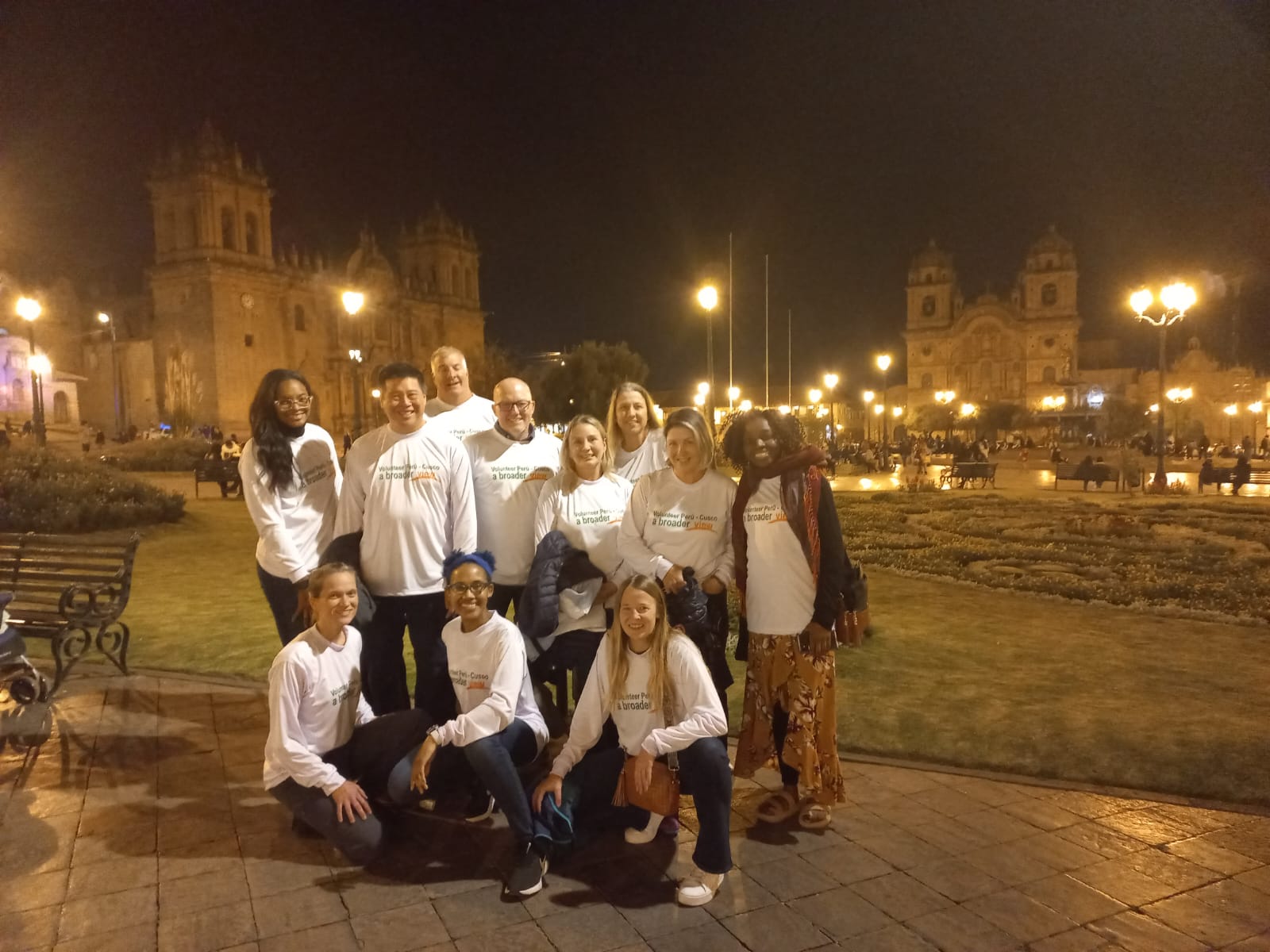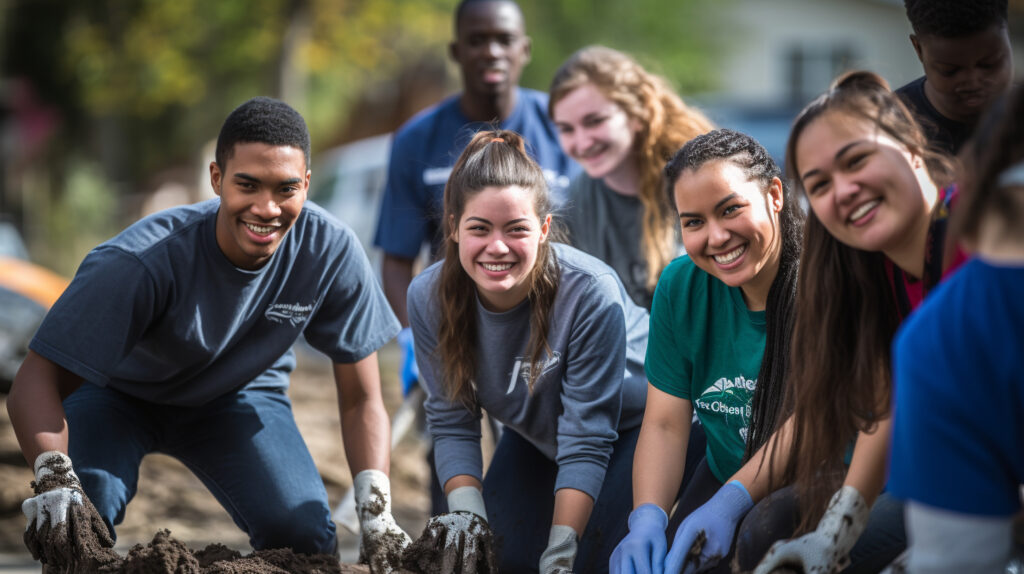The hustle, bustle, and challenges of college life often-confined students to textbooks, projects, quizzes, and assignments. However, in the midst of this routine, have you ever considered stepping out of your comfort zone and contributing to society? Have you ever contemplated volunteering? Well, the experience can be incredibly rewarding.
Not only does volunteering foster personal development, understanding of societal issues, and enhance career opportunities, it also undoubtedly impacts the society we live in. As college students navigate through the early stages of adulthood, volunteering can be a portal to building a well-rounded personality, fostering empathy, and making a real difference.
From mental health improvement to skills enhancement, we will be unwrapping some of the profound benefits volunteering offers to college students. Let’s embark on this journey of exploration together, discovering the impact, statistics, and true essence of college student volunteering.
Volunteering Statistics for College Students
Everyone knows about the importance of extracurricular activities in college life. What’s less known is how prevalent volunteering is among college students. Scratch beneath the surface, and you’ll find some intriguing trends and patterns bubbling to the surface. The wonderful world of statistics, like the ocean, has a lot going on beneath its surface. So, let’s dive in and explore the ocean of volunteer statistics for college students.
Volunteer Engagement by Gender
When it comes to volunteer engagement, there’s a stark imbalance between genders. Out of the 119,638 student volunteers employed in the US, a considerable 65.5% are women, leaving only 34.5% men.
Why are female students more inclined to volunteering? It would take a separate study to figure out, but it’s an interesting fact to note.
Mentoring Activities
Delving further into the activities student volunteers engage in, we uncover an intriguing racial disparity. A significant 39.2% of black student volunteers play the noble role of mentors, compared to only 22.3% of their white counterparts.
Mentoring can be an incredibly enriching experience, both for the mentor and the mentee. Seeing the racial variation in mentoring percentages could prompt a conversation about increased awareness and encouragement for mentoring amongst all ethnic groups.
Declining Rates of Volunteering
Although the numbers of student volunteers are significant, it’s impossible to neglect an undeniable truth: Volunteer rates are declining. Currently, only 26% of college students are actively volunteering.
We may speculate why less college students are volunteering. Could it be due to increased academic pressure, or a generational shift in priorities? These rates might serve as a wake-up call to colleges and organizations to make volunteering more appealing.
Start of Volunteering Journey
The question often arose, when do most students begin their volunteering journey? Interestingly, Becoming a volunteer holds no age limit; it begins when a person becomes responsive towards societal issues and decides to contribute.
Volunteer Rates Among Graduates
One may assume that once students graduate and step into professional life, they’d have less time for volunteering. Surprisingly, that’s not the case. As it turns out, about 4% of college graduates make time for volunteering annually, dedicating an average of 50 hours per year to their chosen cause.
The commitment towards making society a better place doesn’t disappear with a degree. It’s a testament to how ingrained the spirit of volunteerism often becomes in college.
Impact of Volunteering on Employment
Volunteering does not just contribute to society; it can significantly enhance the volunteer’s personal and professional growth. The skills, experiences, and networking opportunities gained through volunteering can heighten their employability. Not to mention the good it does for their soul, contributing to happiness and fulfilment in life.
So, whether you’re a student considering volunteering, or already one of the inspiring thousands pouring your time and energy into great causes, keep going! Just as every drop in the ocean counts, so does every hour spent volunteering. With every volunteer hour, you’re making a difference, and that is nothing short of extraordinary.
Positive Effects of Volunteering on Mental Health
In today’s fast-paced, digital age, it’s easy to forget about the importance of physical and mental well-being. We’re so occupied with work, social media, and daily obligations that we often disregard our own health. Yet, there lies a simple and rewarding solution to this problem – volunteering! Not only does volunteering contribute to the greater good, but it also significantly uplifts our mental state. Its impact ranges from enhancing mental health and curtailing depression to managing stress levels effectively.
Increase in Mental Health
It’s no secret that the altruistic act of volunteering can positively affect one’s mental health. When you lend a hand to the community, you engage in meaningful work that instills a sense of purpose and achievement. Fascinatingly, volunteering is directly associated with an 8.5% increase in mental health. As you interact with diverse individuals, you develop empathy, improve your interpersonal skills, and boost your confidence – all of which contribute to enhanced mental health.
Now, let’s delve a bit deeper into these effects:
- Enhanced self-esteem: As you realize your potential to make a difference, it fills you with a newfound self-worth.
- Better mood: Helping others instigate positive emotions, leaving you with a more positive outlook.
- Cognitive stimulation: Challenges during volunteering keep your mind active, promoting mental agility.
Decrease in Depression Rates
Depression is a rising concern worldwide. However, engaging in volunteer activities can help combat this issue. Studies show a 4.3% decrease in depression rates due to volunteering. Why? Donating your time and energy to a cause helps you build social connections, keeping feelings of loneliness and isolation at bay. But, the benefits don’t stop there!!
Positive effects of Volunteering on Depression:
- Shared experiences – can create a sense of camaraderie.
- The act of giving – stimulates the release of endorphins, instilling a natural sense of happiness.
- Reduced isolation – enriches your social life, creating a network of support.
Effects on Stress Levels
Stepping out of your regular mundane routine to volunteer diversifies your life experience and reduces stress levels. Engaging in humanitarian activities provides a pleasant distraction from personal worries, leading to lower cortisol (the stress hormone) levels. It’s thus no wonder that volunteering is seen as an effective form of stress relief.
So, how does volunteering reduce stress?
- Mindful action: Volunteering promotes mindfulness, which helps cope with stress better.
- Sense of accomplishment: Meeting objectives during volunteer work brings fulfillment, alleviating stress.
- Social connections: Forming friendships while volunteering gives emotional support, offering a de-stressing effect.
Volunteering isn’t just about helping others – it’s also an investment in your own mental health. As you contribute your time and skills to a worthy cause, it elicits profound benefits for your mental well-being. The above data underline the potential of volunteering as an effective tool not just for societal wellbeing but also for personal mental health improvement. So, why wait? Step out, volunteer, and experience the joy of giving. Your mental health will thank you!
Skills and Prospects Enhancement
Learning a language is not just about communicating fluently. It also opens a myriad of opportunities that can significantly enhance your skills and career prospects. Many students and professionals have successfully utilized their English language abilities to their advantage in various realms of life, from academic pursuits to professional advancements. This section explores multiple facets of how the English language can help to design the path to your success.
Skills Building
The English language is more than just a means of communication. It’s a handy tool that helps in building valuable skills for academia and the job market. Individuals who beyond fluently speak English can also develop critical skills such as problem-solving, creativity, and leadership. It takes constant practice to learn a language, and this process can help you hone your efforts in persistence and discipline as well.
Career Prospects
In a globalized world where English is often the lingua franca, having a strong command of this language can open up numerous career pathways. A proficient English speaker can pursue opportunities in international organizations, multinational corporations, and even in academics where English is commonly used medium. Such individuals usually have a competitive edge over others in job applications, as language proficiency is a highly sought-after skill in today’s business world.
Real-world Experience
Knowing English can also enable students to apply the knowledge they’ve gained in the classroom to practical scenarios. For instance, students can participate in international programs, conferences, or internships where English is the primary means of communication. Such exposure helps students discover new cultural experiences and gain first-hand experience of a global working environment.
College and Scholarship Application Advantages
Another terrific benefit of mastering the English language is that it can help students stand out in college and scholarship applications. Especially, when it comes to studying abroad or in predominantly English-speaking universities. Admissions teams often value candidates who’re not only academically strong but also have a good command of English.
Professional Connections
Strong English skills can also open the doors to meaningful networking opportunities. A diverse range of professionals from around the globe uses English as their working language. Knowing English allows individuals to connect with these professionals, participate in enriching conversations, and develop professional relationships that could prove advantageous in their career growth.
To sum up, learning the English language isn’t just about expanding your linguistic repertoire. It is a strategic investment that can help build crucial skills, broaden career prospects, offer real-world experience, provide a competitive edge in college applications, and create lasting professional connections – all significantly beneficial in shaping one’s career. So, embrace this journey of language learning and unlock numerous exciting, rewarding opportunities.
Conclusion
There’s no denying the profound effects that volunteering can have. Be it enhancing mental wellness, honing job skills, or contributing to your professional network, the benefits are indeed immense. Most importantly, it’s about the enduring changes you can make in the lives of individuals and the communities you serve.
If you’re a college student looking to make a difference and embarking on a journey that offers diverse cultural exchanges and sustainable projects, check out A Broader View. This remarkable organization, dedicated to community development and empowerment, provides opportunities in over 32 countries across Africa, Asia, Central America, and South America.
Embarking on such a journey will not just be a conventional volunteering experience but a life-changing chapter that will enrich your soul and broaden your worldview. So why wait? Step forward to create a difference and pave the way for a bright, fulfilling future. Your opportunity to create a lasting impact awaits at A Broader View.
Frequently Asked Questions
- How can volunteering with www.abroaderview.org benefit college students?
Volunteering with www.abroaderview.org can benefit college students by providing them with opportunities to gain practical experience, develop valuable skills, broaden their perspectives, enhance their resumes, and make a positive impact on communities in need.
- What types of volunteering programs are available through www.abroaderview.org for college students?
www.abroaderview.org offers a wide range of volunteering programs for college students, including teaching, healthcare, environmental conservation, orphanage support, community development, and many more.
- How do I apply for a volunteering program with www.abroaderview.org?
To apply for a volunteering program with www.abroaderview.org, college students need to visit their website, browse through the available programs, select the one that interests them, fill out the application form, and follow the provided instructions for further steps.
- Are there any costs involved in volunteering through www.abroaderview.org?
Yes, there are costs involved in volunteering through www.abroaderview.org. These costs typically cover accommodation, meals, in-country support, and administration fees. However, the specific costs may vary depending on the chosen program and destination.
- Can volunteering with www.abroaderview.org be done during college breaks?
Yes, volunteering with www.abroaderview.org can be done during college breaks as they offer flexible program durations. Students can choose programs that align with their break schedules, whether it’s during summer, winter, or any other breaks.
-
Safe Solo Volunteering Abroad | Empowerment FemalesThrough Service with ABV

Embrace the adventure of a lifetime with ABV’s supported solo volunteering programs. Create lasting friendships, make a real difference, and explore the world safely under a supportive umbrella. Recommend Peru, Ecuador, Colombia, and more. Table of Contents Introduction to ABV and Solo Volunteering Traveling solo can be a thrilling yet daunting endeavor. A Broad View…
-
Empowerment Through Sustainable programs: Volunteer Opportunities in Peru Cusco

Discover empowering volunteer opportunities in Peru Cusco with www.abroaderview.org. Support sustainable programs and make a positive impact while gaining valuable experiences.
-
Midwives & Obstetricians: Empower Mothers & Babies Abroad

Discover how midwives and obstetricians from abroad can empower mothers and babies through the programs offered by www.abroaderview.org. Make a difference today.



